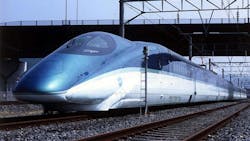TOKYO — Japan is set to build India's first bullet train, with Tokyo financing the project through an $8 billion loan to New Delhi, according to a Tuesday report in The Nikkei, a leading Japanese business daily.
The Nikkei, which did not cite sources, said the bullet train will link the cities of Mumbai and Ahmedabad, and that the two countries will issue a joint statement about the deal on Saturday during Prime Minister Shinzo Abe's visit to India, where he will meet Prime Minister Narendra Modi.
The report comes after Japan failed to win a high-speed train deal in Indonesia earlier this year, losing out to a Chinese proposal.
A deal with India would be the second successful case of Japan exporting its bullet train technology to a foreign market, following a deal with Taiwan in 2007, Japanese officials said.
Two officials from Japan's trade and transportation ministries refrained from confirming the contents of the Nikkei article, telling AFP only that the Japanese government was making "utmost efforts toward such an agreement."
Abe, who departs Friday for India, is to tell Modi that Japan will provide one trillion yen ($8.14 billion) worth of loans during the next decade that would finance more than half of the approximately 980 billion Indian rupee ($14.67 billion) cost of the project, the Nikkei said.
The introduction of high-speed links and bullet trains were one of the key campaign promises of Modi, who was elected in May 2014.
India's vast rail network runs 12,000 trains a day, carrying 23 million people and connecting about 8,000 stations, but has suffered decades of neglect at a time of rapid economic growth during which car ownership has surged and low-cost airlines have mushroomed.
Modi's government said last year it would open up the railways to foreign investment as they struggle to win back freight traffic lost to roads, coastal shipping and planes.
Last year an Indian passenger train set a new national speed record of 100 mph — just half the speed of the Japanese shinkansen.
Copyright Agence France-Presse, 2015
About the Author
Agence France-Presse
Copyright Agence France-Presse, 2002-2025. AFP text, photos, graphics and logos shall not be reproduced, published, broadcast, rewritten for broadcast or publication or redistributed directly or indirectly in any medium. AFP shall not be held liable for any delays, inaccuracies, errors or omissions in any AFP content, or for any actions taken in consequence.
